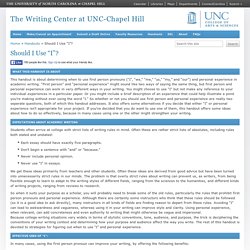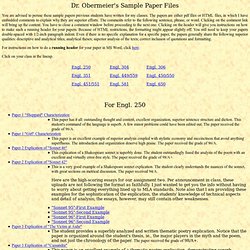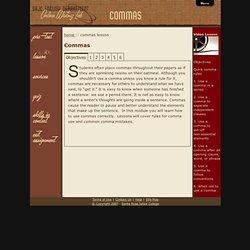

Argument essays, graphs, other writing, and speaking for IELTS, PET, and TOEFL. Avoiding the personal pronoun 'I' Features of Academic Writing. Should I Use "I"? What this handout is about This handout is about determining when to use first person pronouns (“I”, “we,” “me,” “us,” “my,” and “our”) and personal experience in academic writing.

“First person” and “personal experience” might sound like two ways of saying the same thing, but first person and personal experience can work in very different ways in your writing. You might choose to use “I” but not make any reference to your individual experiences in a particular paper. Or you might include a brief description of an experience that could help illustrate a point you’re making without ever using the word “I.” So whether or not you should use first person and personal experience are really two separate questions, both of which this handout addresses. Expectations about academic writing Students often arrive at college with strict lists of writing rules in mind.
We get these ideas primarily from teachers and other students. Effective uses of “I”: Deciding whether “I” will help your style. Sample Literature Papers. Dr.

Obermeier's Sample Paper Files You are advised to peruse these sample papers previous students have written for my classes. The papers are either pdf files or HTML files, in which I have embedded comments to explain why they are superior efforts. The comments refer to the following sentence, phrase, or word. Clicking on the comment link will bring up the content. For instructions on how to do a running header for your paper in MS Word, click here. Click on your class in the lineup. For Engl. 250 Paper 1 "Sheppard" Characterization This paper has it all: outstanding thought and content, excellent organization, superior sentence structure and diction.
The Three R’s: Rubrics, ‘Riting, and Redos. Commas Lesson. Introductory Clauses: When beginning a sentence with an introductory clause (as in this sentence), a comma is typically necessary to signal the reader as to when the introductory phrase or clause is complete. examples: As you can see, the problem is much bigger than we imagined.

Because we have had so much rain this year, construction of the new highschool will take an additional six months. Jake brought his best friends from school, John and Alex, home with him for Thanksgiving dinner. Watch out, however, for clauses used as the subject of a sentence; one should never separate a subject from the verb of the sentence: example: What she has always wanted is now within her reach. Introductory words: Sometimes a sentence begins with a single word that needs to be set off from the rest of the sentence. mild exclamations or interjections: Hey, I thought you were going to study tonight instead of come with us to the movies. A name in a direct address: Miguel, do you want another cup of coffee?
Thesis Statements.